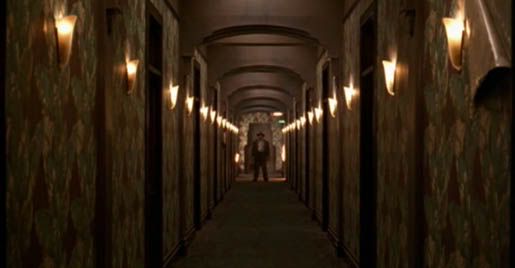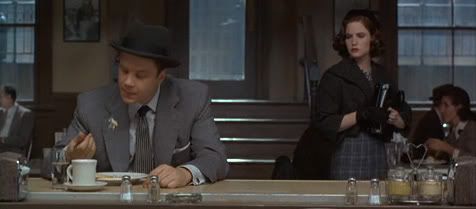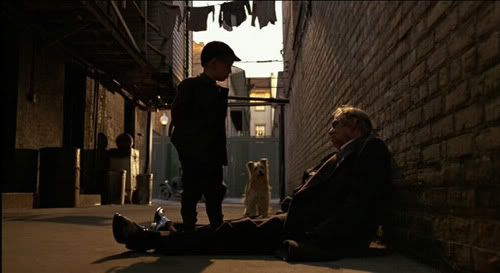Still haven't seen Lebowski or Hudsucker,
but for now,
these are my fave:
5. Blood Simple
Simply because this is the beginning of all things Coen. And in the manner of all things Coen, no more explanation is needed from this point on. And yet again, as in all things Coen, this may be b'cuz of either some personal artistic liberty or maybe just b'cuz I really don't have anything to say.
Just like all things Coen, it's probably just best to leave you guessing.
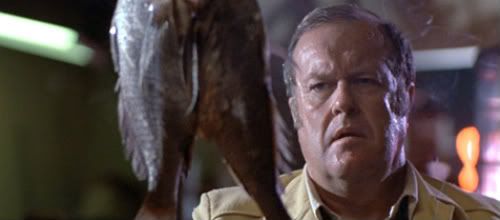
4. O Brother Where Art Thou?
By far, the second funniest film in the sublimely funny hick movie genre. Unfortunately, there are only two movies that make up this genre, so far (the #1 movie in this list being the other one. Oh, and that's a list spoiler alert). However, that takes nothing away from the fact that this film wuz bonafide.

3. The Man Who Wasn't There
The ironic thing about this movie is
that the man in question was there.
I know, cuz I saw this movie.
And don't worry, I'm not giving anything away by saying that.
Let me also add that, as far as the rating for this movie goes,
Billy Bob's performance is great, as usual,
James Gando is cool, as usual
& Scarlett Jo is simply gorgeous, as usual.
Over-all, a top notch quality pic from the Bros. Coen.
As usual.
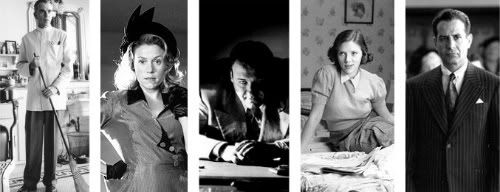
2. Fargo
When blood has been shed in the small town of Brainerd, Minnesota, there's only one person you should be calling: Marge Gunderson.
A police chief & expectant mother who, when there's a crime to investigate or a hotel buffet that's reasonably priced, she'll make sure to be there in a jif.
That is, if, well, y'know.... her car doesn't need a jump or somethin'.
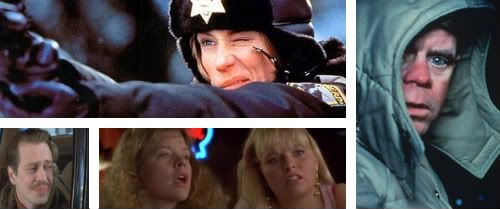
1. Raising Arizona
Babynapping (as in kidnapping, not baby napping) at it's finest. By far, my favorite Nick Cage performance. And also by far, the funniest movie in the whole of the sublimely funny hick movie genre. (Which, BTW, is a genre that I really don't how to clearly define. Which is why I like to categorize Coen Bros. film in it.)

but for now,
these are my fave:
5. Blood Simple
Simply because this is the beginning of all things Coen. And in the manner of all things Coen, no more explanation is needed from this point on. And yet again, as in all things Coen, this may be b'cuz of either some personal artistic liberty or maybe just b'cuz I really don't have anything to say.
Just like all things Coen, it's probably just best to leave you guessing.

4. O Brother Where Art Thou?
By far, the second funniest film in the sublimely funny hick movie genre. Unfortunately, there are only two movies that make up this genre, so far (the #1 movie in this list being the other one. Oh, and that's a list spoiler alert). However, that takes nothing away from the fact that this film wuz bonafide.

3. The Man Who Wasn't There
The ironic thing about this movie is
that the man in question was there.
I know, cuz I saw this movie.
And don't worry, I'm not giving anything away by saying that.
Let me also add that, as far as the rating for this movie goes,
Billy Bob's performance is great, as usual,
James Gando is cool, as usual
& Scarlett Jo is simply gorgeous, as usual.
Over-all, a top notch quality pic from the Bros. Coen.
As usual.

2. Fargo
When blood has been shed in the small town of Brainerd, Minnesota, there's only one person you should be calling: Marge Gunderson.
A police chief & expectant mother who, when there's a crime to investigate or a hotel buffet that's reasonably priced, she'll make sure to be there in a jif.
That is, if, well, y'know.... her car doesn't need a jump or somethin'.

1. Raising Arizona
Babynapping (as in kidnapping, not baby napping) at it's finest. By far, my favorite Nick Cage performance. And also by far, the funniest movie in the whole of the sublimely funny hick movie genre. (Which, BTW, is a genre that I really don't how to clearly define. Which is why I like to categorize Coen Bros. film in it.)

Last edited by TheMightyCelestial; 05-09-11 at 08:28 PM.















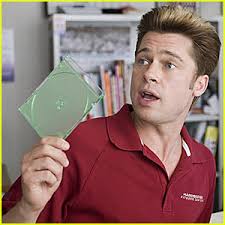
 like you I will see it , own it and watch it several times, i am sure
like you I will see it , own it and watch it several times, i am sure 